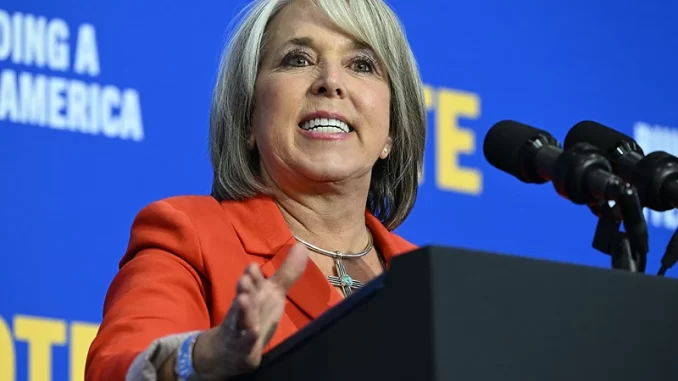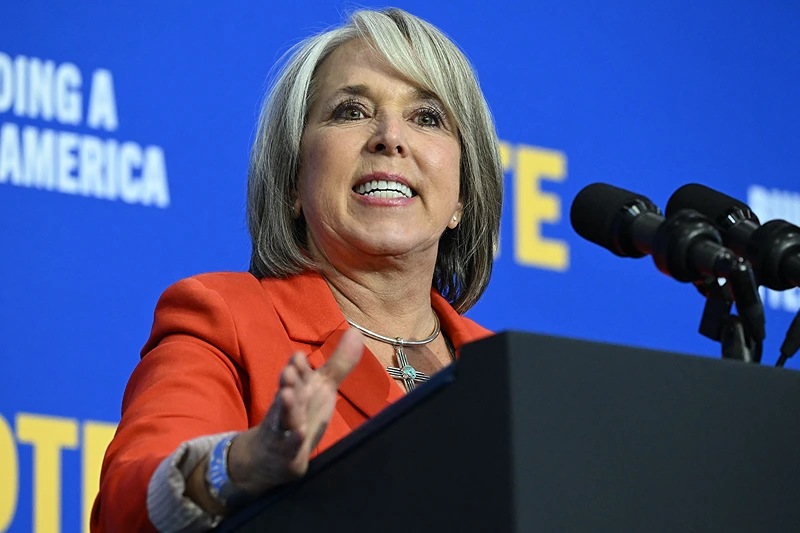

OAN Brooke Mallory
UPDATED 4:42 PM – Tuesday, March 21, 2023
Governor Michelle Lujan Grisham (D-N.M.) and the state’s top health authorities issued a warning that any caretakers who mistreat or abuse developmentally-impaired or other vulnerable people will face serious repercussions.
In order to provide an update on ongoing inquiries regarding an alleged abuse and neglect case involving a disabled person that was brought to the state’s attention in early March, Governor Grisham was joined by members of her cabinet and law enforcement officials at the state Capitol.
Four service providers in the Albuquerque region had their contracts with the state terminated as a result of the lawsuit.
Also, it sparked a “forensic assessment” of the entire developmentally-disabled waiver system, which is intended to provide an alternative to institutional care, according to the governor.
Investigations are ongoing in five additional incidents, three of which involved deceased patients.
Authorities stated that they have not established a connection between those deaths and abuse or neglect.
More than 1,000 participants in the federally-sponsored waiver program were visited over the course of the weekend by state health officials.
As a result, officials said that eight further possible instances need to be reviewed in the future.
“If you’re not providing the care that you were supposed to provide, we will find you, and you will be held accountable. That’s it — zero tolerance in the state of New Mexico. We are coming,” Governor Grisham said in a conference.
Grisham, whose sister has developmental disabilities, says the latest information regarding abuse of these vulnerable individuals is “alarming.” She also stated that the state will not stand for mistreatment, neglect, or exploitation of any kind whatsoever.
The claims that sparked the preliminary investigation and the termination of the physicians’ contracts have been kept discreet by representatives of the New Mexico Department of Health.
On Monday, Health Secretary Patrick Allen said that the client involved in the March 1st case had endured life-threatening injuries, but refrained from mentioning any more details.
Allen also claimed that neglectful behaviors such as starvation were also involved in the other cases discovered recently.
Several cases of neglect and abuse went undetected, according to Grisham, in part because of the coronavirus pandemic and rigorous public health regulations that prevented family members or other support systems from visiting the patients.
The number of referrals for possible abuse or neglect decreased as a result, she claimed, and neither telehealth visits nor online wellness checks have been able to fill their place.
She implied that doing so allowed other unchecked, sinister activities to flourish.
The governor cited a current Michigan case involving a 71-year-old lady who was born with a spinal abnormality that prevented her from being able to communicate or care for herself. She tragically ended up dying of starvation at a group home.
In the upcoming 30 days, Allen said his organization will work with the state’s Aging and Long-Term Services Department to visit the remaining 5,100 individuals enrolled in the developmentally impaired waiver program.
Additionally, the state intends to make future visits more frequent and to check all case files, as opposed to just the ones that physicians send to Medicaid for reimbursement.
People with disabilities are typically more vulnerable and at risk, due to factors like dependency on caretakers, limited transportation alternatives, limited availability of language interpreters or other assistive technologies, and overall social isolation, according to Allen.
“Escaping abuse is difficult for any victim, but it’s only compounded when the person abusing you is the one you rely on to help you dress and get out of the house,” he said.
No charges have been brought against any of the caregivers who were allegedly engaged in the initial March 1st incident, despite the fact that they are all no longer employed in those positions.
Officials emphasized on Monday that the inquiries were still ongoing.
Residential in-home care was provided by one of the providers whose contract was terminated, and the agency that provided that care posted a statement on its website claiming that it immediately notified state officials after learning of “significant injuries” suffered by one of their clients as a result of an employee choosing to transport that client out of state. The case was described as “heartbreaking”.
The victim received case management, behavioral therapy, and physical therapy from the other service providers. They similarly claimed to be unaware of the accusations.
Several of these ex-caregivers are now attempting to contest the state’s decision to terminate their contracts, citing long histories of providing beneficial services to disabled individuals.

